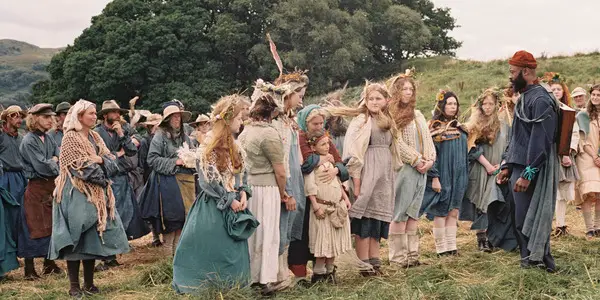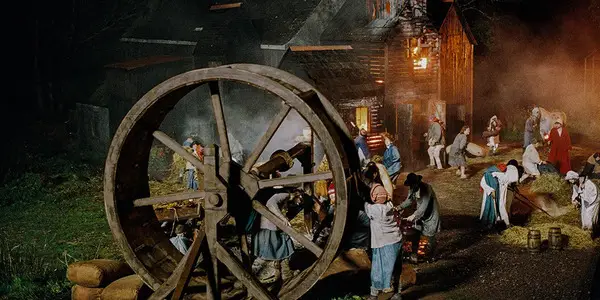HARVEST: A Folkloric Drama Filled With Ambiguities

Soham Gadre is a writer/filmmaker in the Washington D.C. area.…
When Lars von Trier made Dogville there was a lot of consternation over what that film said about America. Was it pro or anti? Was it spitting in the face of colonialism, the mafia, insular communities, or nefarious intruders? The layered density of a film like that cannot really be about just one thing, and the concise vision and focus it has in depicting a community in cannot lend itself to be about all of those things. Athina Rachel Tsangari’s Harvest, a film that follows a similar dissertation on a deeply isolated community that faces a reckoning for its existence, is by contrast, precisely about one thing – greed. This lends it to be a very straightforward, undemanding film for better and for worse.
Explicitly Nameless

The setting of Harvest is never explicitly stated. “We didn’t have names for these things before. It was just ‘the village’ and ‘the fields’” responds Walter Thirsk (Caleb Landry Jones) upon seeing the newly created map of the land by the cartographer Quill (Arinzé Kene). Thirsk is friendly to newcomers to the village, even the ones who are chastised as intruders and arsonists. He has good in his heart, but he is betrayed by his hospitality. It soon comes to the realization of the town that Quill was sent by a group of aristocrats from the larger city to claim and reshape the land. Tsangari’s film plays very heavily into the ambiguity not just of the name, the culture, or the time, but also the politics. The darker-skinned characters are never explicitly racially profiled through words but the suspicion of them is palpable in ongoing conversations. Capitalism nor class are ever explicitly named as what befalls the village people or their ‘place’ in the world versus the ‘landowners’, but their meager living and work and unwillingness to display violence clearly hints at differences in lifestyles. This feels like a film that takes half-measures in displaying its more potent tragedies, that it never wants to explicitly be about anything while desperately trying to make a point.
Interesting and Non-Committal
The 16mm film lends a nice warm, rustic, and aged look to the film’s rudimentary community and land, and the sequences of Jones at the beginning focusing on his hands, mouth, and skin being intimately in contact with nature establishes a very tangible sense of belonging and feeling for the people and land that carries throughout the film. Tsangari doesn’t shy away from flair and the film’s rural old-world setting gets refreshingly interrupted by highlighter purple and neon green lighting in a campfire dance setting that mixes the folkloric ritualistic dances with costumes with a jarring modernist lounge/clublike sequence. The film is, perhaps a bit too coyly, in constant crisis between tradition and change.

Even apart from the main plot we see characters slip into modern English slang and portray a level of racial and gender conscience that feels incongruous to the supposed isolationist setting. One might even expect as in Alex Cox’s Walker that the seams might break open and reveal the 21st century at any point. This is the heart of the film’s strangeness. It is a film set in the past hinting about the politics of today and committing to neither.
Conclusion
There isn’t really a hypnotic or even transportive feeling in Harvest. It feels, like von Trier’s treatise on America in Dogville, like it knows it’s a fabrication. But it’s a fiction that aims to tether itself to real political and social issues of the time. When immigration, the idea of “intruders”, the predatory nature of landowners on the working class, and the prejudices of traditionalist society all come to boil, Harvest hints at the crumbling foundations and fracturing of trust. One just wishes that there was some conviction here, a sharpened point on the spear, but Tsangari seems satisfied to keep Harvest as a teaser, a tragedy of a place with no name and leaving it nameless and without doctrine.
Harvest releases in US theaters on August 1st, 2025.
Does content like this matter to you?
Become a Member and support film journalism. Unlock access to all of Film Inquiry`s great articles. Join a community of like-minded readers who are passionate about cinema - get access to our private members Network, give back to independent filmmakers, and more.
Soham Gadre is a writer/filmmaker in the Washington D.C. area. He has written for Hyperallergic, MUBI Notebook, Popula, Vague Visages, and Bustle among others. He also works full-time for an environmental non-profit and is a screener for the Environmental Film Festival. Outside of film, he is a Chicago Bulls fan and frequenter of gastropubs.













